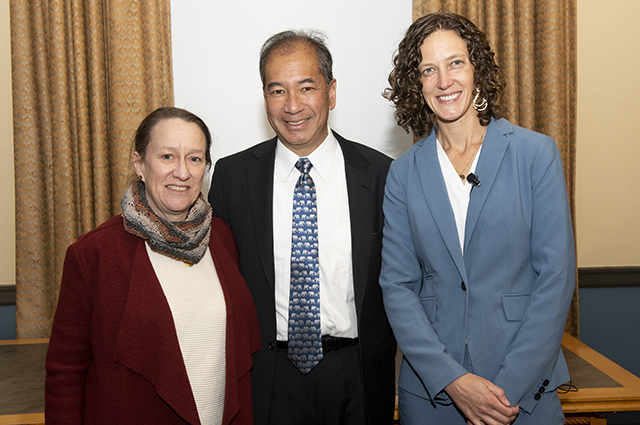Tufts celebrates Tiampo Family Professorship

This fall, Tufts University celebrated the Tiampo Family Professorship in Engineering. The professorship was established in 2018 to recruit and retain outstanding junior faculty members with a generous gift from James J., E83 and A83, and Kristy F., E83, Tiampo, who met while studying civil engineering at Tufts.
“It’s an honor to receive this recognition for the research that my lab does to improve child health in low-income countries,” Tiampo Family Assistant Professor Amy Pickering said while thanking the Tiampo family, who were in attendance at the celebration. “This type of support opens up new opportunities for our lab.”
Pickering’s lab focuses on environmental surveillance for infectious disease and antibiotic resistance, links between climate and waterborne disease, and novel water and sanitation interventions. Worldwide, 2.2 billion people lack access to safe water, according to the WHO/UNICEF Joint Monitoring Programme (JMP) – that means water that is available when needed, accessible, and not contaminated. The United Nations Sustainable Development Goals have set a high benchmark: ensuring access to water and sanitation for all by 2030.
Quantitative studies and novel innovations, like the ones carried out and developed by Pickering’s lab, are helping to move the needle. In her lecture at the Tiampo Family Professorship celebration, Pickering highlighted research on several methods of providing safe, accessible drinking water to low-income communities in Kenya and Bangladesh that don’t have regular access to electric power.
In Kenya’s Western Province, Pickering and colleagues worked with local kiosk owners to set up a program in which the kiosk owners sold chlorinated water that had been treated by Venturi dosers – low-cost devices that fit onto taps – designed by the researchers. Critically, the devices provided adjustable doses of chlorine and didn’t require electricity. The researchers field tested the dosers and studied the sustainability of the business model, providing the kiosk owners with several service packages to choose from, and followed the long-term results. Two years later, all of the dosers were still in use, and several kiosk owners chose to lease-to-own them.
In Dhaka, Bangladesh, Pickering and collaborators adapted a novel device to disinfect water with solid chlorine tablets. It was fitted to the inlets of the tanks that Dhaka residents draw their water from. The tablets eroded in water as it passed through the inlet into the tank, providing treated water without the need for electricity. In research published in The Lancet Global Health, the researchers found a 23% reduction in diarrhea, an 11% reduction in health care costs, and that people drinking water from the tanks with the dosers were 30% less likely to require treatment for gastrointestinal illness.
Ultimately, Pickering concluded, interventions are needed that can provide accurate doses of chlorine at a taste level that’s acceptable to drinkers, that don’t require behavior change on the part of users, and that utilize novel technology that can reduce costs and widen the target market.
The establishment of the Tiampo Family Professorship in Engineering was inspired by the Tiampos’ belief that engineering is a creative and collaborative discipline best taught from a rich diversity of perspectives and discussion. The professorship is intended to help support that commitment within the School of Engineering faculty, principally among junior faculty like Pickering who will be instrumental in teaching, learning, and research at Tufts for years to come.
Department:
Civil and Environmental Engineering